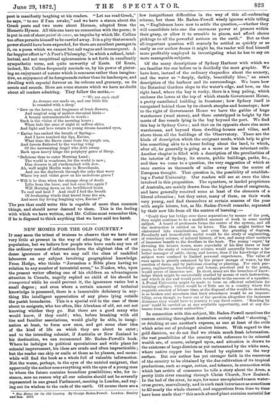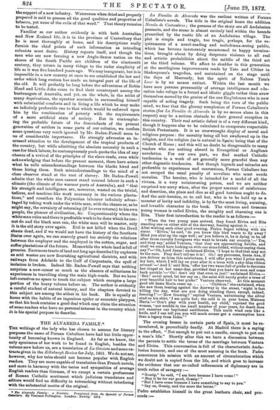NEW HOMES FOR THE OLD COUNTRY.*
IT may seem the tritest of truisms to observe that we have done very little at present in the way of educating the mass of our population, bat we believe few people who have made any use of the ordinary means of information form the slightest idea of the dense ignorance of what we may call the class of unskilled labourers on any subject involving geographical knowledge. From Hodge, who thinks "Jerusalem a Bible place having no relation to any number of terrestrial acres," to Noakes, who, upon the present writer offering one of his children an advantageous situation in Canada, angrily replied no child of his should be transported while he could prevent it, the ignorance varies but a small degree ; and even where a certain amount of technical knowledge is possessed, there is a lamentable deficiency in any- thing like intelligent appreciation of any place lying outside the parish boundaries. This is a special evil in the case of those about to emigrate, who too often, like Abraham of old, set out not knowing whither they go. But there are a good many who would know, if they could ; who, before breaking with old ties and familiar associations, would gladly be able, in imagi- nation at least, to form new ones, and get some clear idea of the kind of life on which they are about to enter ; and to the intending colonist, if Australia or New Zealand be his destination, we can recommend Mr. Baden-Powell's book. Where he indulges in political speculations and wide plans for colonial improvement, his ideas are crude and often impracticable ; but the reader can skip or smile at these as he pleases, and mean- while will find the book as a whole full of valuable information. Not the worse, perhaps, in the eyes of the untried emigrant, that apparently the author sees everything with the eyes of a young man to whom the future contains boundless possibilities; who, for in- stance, sees no reason why all our colonies should not be severally represented in one grand Parliament, meeting in. London, and ray- ing out its wisdom to the ends of the earth. Of course there are a * New Homes for the Old Country. By George Baden-Powell. London: Bentley and Son. 1872.
few insignificant difficulties in the way of this all-embracing scheme, but these Mr. Baden-Powell wisely ignores while telling us, "Englishmen have now to settle the question,—whether they will consolidate into one the enormous power at present within their grasp, or allow it to crumble to pieces, and afford choice pickings to all the powerful nations on the earth." But as that all-important question will scarcely be settled so quickly or so easily as our author deems it might be, the reader will find himself more profitably employed in investigating what he has to say on more manageable subjects.
Of the many descriptions of Sydney Harbour with which we are familiar the one before us is decidedly the most graphic. We. have here, instead of the ordinary rhapsodies about the scenery, and the water so "deeply, darkly, beautifully blue," an exact.
description of the harbour and its surroundings. We learn how the Botanical Gardens slope to the water's edge, and how, on the right hand, where the bay is rocky, there is a long paling, which encloses the lawns at the top of which stands Government House, a pretty castellated building in freestone ; how Sydney itself ía recognised behind these by its church steeples and housetops ; how to the right of Government House we have the gables of huge warehouses (wool stores), and these outstripped in height by the- masts of fine vessels lying in the bay beyond the port. We find this bay is Sydney Cove ; and that on its opposite shore rise more warehouses, and beyond them dwelling-houses and villas, and above them all the buildings of the Observatory. These are the kinds of description which the emigrant needs, which help to give him something akin to a home feeling about the land, to which, after all, he generally is going as a more or leas reluctant exile._ Another chapter is filled with a description of the peculiarities of the interior of Sydney, its streets, public buildings, parks, &c., and then we come to a question, the very suggestion of which at once carries us thousands of miles away from the centre of European thought. That question is, the possibility of establish- ing a Postal University. Our readers will see at once the idea involved in this proposition. The squatters, or landed proprietor& of Australia, are mainly drawn from the highest class of emigrants, and have generally received some at least of the elements of a liberal education ; but they enter, many of them, on their work very young, and find themselves at certain seasons of the year with ample leisure, but, as Mr. Baden-Powell remarks, separated by their new life from all the centres of learning :—
" Could they but bridge over these separations by means of the post,. they might continue to do a modified amount of work in some useful subject. A board of professors forms the centre of the system, and all the instruction is carried on by letter. The idea might further be elaborated into examinations, and even the granting of degrees. Peculiarly and immediately useful would be the study of engineering. of veterinary science, of natural history, of law, and many other matters of immense benefit to the dwellers in the bush. The young super,' by devoting the leisure hours, more especially of his first three or four years, to the study of veterinary science, would assuredly become a far bettor manager of cattle, sheep, and horses, than if his knowledge of the subject were confined to limited personal experiences. The value of runs again is greatly enhanced by the proper storage of water, by the erection of dams, and by judicious clearing or planting. For such pur- poses, engineering knowledge and botany, practical and to the point,. would prove of immense use. In short, many are the branches of know- ledge which might be successfully studied by means of such instruction, and which in the end would prove invaluable to the success of a squatter.. A Postal University might be made to form an efficient substitute for training colleges, which would be of little use in a country where the requisite amount of leisure time, at the disposal of the would-be students, is so broken and uncertain that their attendance would be an impossi- bility, even though we leave out of the question altogether the immense distances they would have to journey to any fixed centre. Reading by post' could be carried on at any available opportunity, and at any dis- tances from the central authorities."
In connection with this subject, Mr. Baden-Powell mentions the custom existing throughout Australian society called "shouting," or drinking at one another's expense, as one at least of the evila which arise out of prolonged aimless leisure. With regard to the
gold districts, we do not find we obtain much fresh information. the vast possibilities of the country with reference to its mineral wealth are, of course, enlarged upon, and attention is drawn to the existence of large districts as yet untenanted by the white man, where native copper has been found by explorers on the very surface. But our author has yet stronger faith in the resources of the country to be obtained by the due cultivation of its tropical
productions, such as sugar, cotton, and tobacco, in connection with which last article of commerce he tells a story about the Avon, a pretty little river running through Christ Church, New Zealand- In the bed of the river, he says, for some unexplained reason water- cress grows, marvellously, and in such rank luxuriance as sometimes to fill nearly the whole channel, and suggestions from time to time have been made that" this much abused plant contains material for the support of a new industry. Watercress when dried and properly prepared is said to possess all the good qualities and properties of tobacco, yet none of the evils of that weed." That theory remains to be tested.



































 Previous page
Previous page